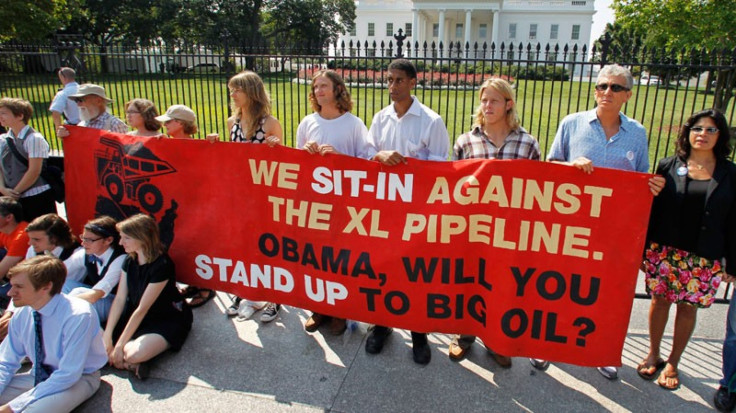Keystone Pipeline Protesters Circle White House, Press Obama

Thousands of protesters opposed to a new oil pipeline from Canada to the United States circled the White House grounds Sunday to press President Barack Obama to reject the project for environmental reasons.
Opponents of TransCanada Corp's Keystone XL pipeline, which would transport crude produced from oil sands, have dogged the president for months, arguing that the carbon emissions produced in the process of extracting oil from the sands would exacerbate climate change.
On Sunday thousands of men and women, many of them wearing orange vests with Stop the pipeline printed on them, lined up around the White House grounds, which include the presidential mansion, the Treasury Department and a sprawling Executive Office Building.
Carrying signs that matched Obama's campaign colors of blue and red, some protesters chanted Hey Obama, we don't want no climate drama and Stop the pipeline, yes we can, copying phrases connected to Obama's successful 2008 election effort.
The pipeline controversy threatens to loom over the 2012 presidential race. Obama faces political pitfalls whether his administration approves or rejects the project.
A decision in favor would support Obama's goal of creating jobs and diversifying energy sources, but it would alienate core Democratic supporters who are already disappointed by his progress in fighting climate change.
We have to leave the tar sands oil in the ground. That's the only solution if we're going to save the planet, said Martin Springhetti, 63, a Democrat and retired teacher from Pennsylvania, who said his active support for Obama next year would depend on the pipeline decision.
I certainly won't work for him, but I won't vote for him if he doesn't ... say no to the pipeline, said actress Margot Kidder, 63, who campaigned for Obama in 2008 in Montana and was arrested at a similar pipeline protest earlier this year.
JOBS AND OIL
The State Department is running the review process for the decision, though Obama has made clear he will influence the final call.
As the president has made clear, he recognizes that there are a number of critical issues involved in this decision, including climate change and impacts on public health and natural resources, said White House spokesman Clark Stevens.
These issues, along with American energy security and economic factors, will be considered in the State Department's ongoing assessment.
The State Department said last week the decision-making process could be delayed past an end-of-year target.
TransCanada said the protesters were ignoring out-of-work Americans who could benefit from the jobs the pipeline would create.
What these millionaire actors and professional activists don't seem to understand is that saying no to Keystone means saying yes to more conflict oil from the Middle East and Venezuela filling American gas tanks, said company spokesman James Millar.
Our opponents can trivialize the jobs the largest energy infrastructure on the books right now in the U.S. will create, but we know the 20,000 Americans we will put to work constructing and manufacturing the parts needed to build Keystone XL feel differently.
Opponents dispute the jobs figures that TransCanada projects. The Sierra Club, a prominent environmental group and one of the organizers of Sunday's demonstration, said the protest was about more than the pipeline itself.
(It) is really about a larger issue, which is getting off oil altogether, said Michael Brune, the group's executive director.
Obama was not at the White House when the protest took place. As he often does on the weekends, the president was playing golf.
(Editing by Anthony Boadle)
© Copyright Thomson Reuters 2024. All rights reserved.




















